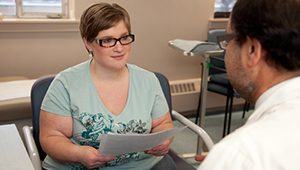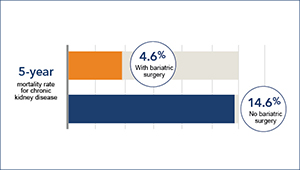Obesity
Research overview
“Obesity is the number-one health problem in the United States because it negatively affects our population’s health more than any other condition,” said Kaiser Permanente Washington Health Research Institute Senior Investigator David Arterburn, MD, MPH. Kaiser Permanente Washington researchers are doing practical research to learn how doctors, patients, families, employers, and policymakers can best work together to prevent and treat obesity.
“We’re focusing on three ways to halt the obesity epidemic,” said Senior Investigator Dori Rosenberg, PhD, MPH. “We’re helping to change obesity-promoting environments, bringing evidence-based prevention and treatment programs into health care systems, and helping people develop lifelong healthy diet and activity habits.”
Kaiser Permanente Washington obesity research areas include:
- reducing sedentary behavior and promoting physical activity and healthy diet in various age groups, populations with chronic conditions, and families;
- shared decision making to help patients find the best way to a healthy weight;
- implementing health coaches in primary care to support behavior changes;
- social networks that support lifestyle change programs;
- relationships between medications and genetic factors in developing obesity;
- health system, community, and national policies that address obesity;
- relationships between obesity and depression, diabetes, and other conditions; and
- long-term benefits and risks of bariatric (weight loss) surgery.
“Obesity is caused by many factors, so at Kaiser Permanente Washington, we’re working on many levels,” said Paula Lozano, MD, MPH, a senior investigator and Kaiser Permanente Washington’s assistant medical director for preventive care. “We’re improving health care to help people who are obese now. But since obesity is a societal problem, we’re also studying how to change our homes and workplaces and neighborhoods to create more healthy environments.”
Recent publications on Obesity
Persky S, de Heer HD, McBride CM, Reid RJ. The role of weight, race, and health care experiences in care use among young men and women. Obesity (Silver Spring). 2014 Apr;22(4):1194-200. doi: 10.1002/oby.20677. Epub 2013 Dec 19. PubMed
Green BB, Anderson ML, Cook AJ, Catz SL, Fishman PA, McClure JB, Reid RJ. E-care for heart wellness: a feasibility trial to decrease blood pressure and cardiovascular risk. Am J Prev Med. 2014;46(4):368-77. doi: 10.1016/j.amepre.2013.11.009. PubMed
Compston JE, Flahive J, Hooven FH, Anderson FA Jr, Adachi JD, Boonen S, Chapurlat RD, Cooper C, Diez-Perez A, Greenspan SL, LaCroix AZ, Lindsay R, Netelenbos JC, Pfeilschifter J, Roux C, Saag KG, Silverman S, Siris ES, Watts NB, Gehlbach SH. Obesity, health-care utilization, and health-related quality of life after fracture in postmenopausal women: Global Longitudinal Study of Osteoporosis in Women (GLOW). Calcif Tissue Int. 2014 Feb;94(2):223-31. Epub 2013 Sep 29. PubMed
Drewnowski A, Rehm CD, Arterburn D. The geographic distribution of obesity by census tract among 59,767 insured adults in King County, WA. Int J Obes (Lond). 2014 Jun;38(6):833-9. doi: 10.1038/ijo.2013.179. Epub 2013 Sep 16. PubMed
Riggs KR, Lozano P, Mohelnitzky A, Rudnick S, Richards J. An adaptation of family-based behavioral pediatric obesity treatment for a primary care setting: Group Health’s Family Wellness Program pilot. Perm J. 2014 Summer;18(3):4-10. doi: 10.7812/TPP/13-144. Epub 2014 Jun 9. PubMed
Researchers in Obesity
 David E. Arterburn, MD, MPHSenior Investigator |
 Allen Cheadle, PhDSenior Investigator, KPWHRI; Senior Research Associate, CCHE |
 Andrea J. Cook, PhDSenior Biostatistics Investigator |
 Maricela Cruz, PhDAssociate Biostatistics Investigator |
 Nicole M. Gatto, PhD, MPHPrincipal Collaborative Scientist |
 Beverly B. Green, MD, MPHSenior Investigator |
 Mikael Anne Greenwood-Hickman, MPHSenior Collaborative Scientist |
 Paula Lozano, MD, MPHSenior Investigator; Director, ACT Center |
 Dori E. Rosenberg, PhD, MPHSenior Investigator |
 Gregory E. Simon, MD, MPHSenior Investigator |











